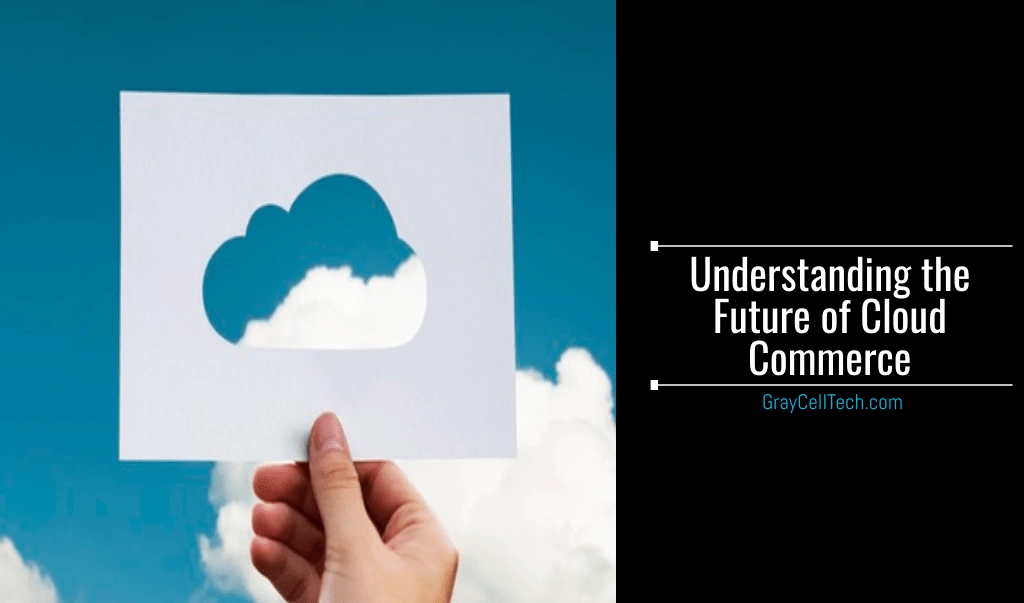This year has been a groundbreaking year. The nature of business changed rapidly with the onset of the coronavirus pandemic. These changes required innovations, tech solutions to make remote work possible, and this couldn’t have happened without the use of cloud data platforms.
Cloud data storage is the present and future of business. Cloud tech used in E-Commerce is a growing industry, set to rise in value to $27 billion by 2024, according to MarketsandMarkets, as businesses require adaptable and accessible online stores and platforms.
With changing buying patterns and habits widespread among consumers and businesses alike, cloud commerce is a vital part of our global economy. This will continue to prove true as businesses adapt to the post-pandemic landscape. Understanding the future of cloud commerce can help you succeed as both a business and a consumer as you navigate current trends.
Here’s what you should know.
Coronavirus and the Importance of Cloud Commerce
Nothing has shifted the trends of business in modern history quite like COVID-19. The pandemic came at a time of technological innovation, breakthroughs in data storage, artificial intelligence, and big data integration that drive myriad industries. Cloud commerce will never be the same because of our increased reliance on it to keep consumers safe and businesses functioning.
Understanding the impacts of the pandemic on the future of cloud commerce, however, requires defining the industry and exploring the effects.
Cloud Commerce Defined
Cloud commerce is the juncture between cloud computing and the marketplace of products and services across the web. It is the innovation instrumental in the trend of modern business as we try to accommodate more and more people conducting all kinds of business and trade from the safety of their homes.
Cloud commerce plays a direct role in business-to-business (B2B) and business-to-consumer (B2C) models of trade, so the developments of cloud tech are widespread and influential. Every company that operates at a digital level whatsoever should take note of the innovations in this field and stay up-to-date on trends to maintain relevance.
The impacts of the pandemic were one instance in which the adoption of cloud commerce technology allowed businesses to remain competitive and meet needs across sectors.
The Impacts of the COVID-19 Pandemic
Every sector of the economy, whether they were trending in that direction before or not, has experienced some level of virtual shift in the wake of COVID-19. About 42% of the American workforce is now working from home full-time, according to a Stanford economist, which means substantial dynamic changes for all kinds of shopping and trade.
Even , both on a public and private scale. Demand for e-learning courses and virtual meeting places are skyrocketing, while traditional offices and classrooms are changing the way they purchase supplies.
This equates to an unprecedented market, one that does not play by the rules we are used to. Because of these widespread and constant changes, cloud commerce and data storage solutions are more important than ever. Only these tools can allow rapid, remote communication for workers and consumers all over the world.
The potential for life-saving solutions through the cloud is likewise great. Take the role of Amazon’s healthcare cloud services in the pandemic economy. The E-Commerce giant has long been taking part in the broader cloud landscape, offering not only a world-wide online pharmacy but electronic health products and solutions that have made a difference in fighting the virus.
Clear back in 2017, Amazon was already representing a huge chunk of medical purchases, making 35% of overall sales and generating $2.1 billion in revenue. Now, the tech giant is revolutionizing supply chain solutions through its Dash buttons and AI-powered cloud tools. Inventory management and shipment has never been easier. This is especially helpful when managing medical supplies during a pandemic.
Innovations like those utilized by Amazon will become increasingly mainstream as other e-sellers look to compete. This means a rapidly evolving future for B2B and B2C cloud commerce companies.
The Future of Cloud Commerce
The future of cloud commerce is bursting with opportunity. Facing the increasingly digital landscape of remote work and digital business, companies of various industries require cloud data solutions to meet their needs. A highly competitive front of cloud data management products, solutions, and services can be expected to emerge, with companies looking to cut costs and reduce problems in their data management systems.
Fortunately, innovations in cloud technology are perfect for commerce solutions and will undoubtedly bring changes to the ways we conduct all kinds of trade.
Cloud Innovations
The field of cloud data and commerce technology is rapidly evolving. Among the emerging trends in cloud computing data storage and trade management are the following processes, each one bringing with it industry-altering developments for B2B and B2C companies alike.
- Blockchain Systems
Blockchain is an evolution of safe data management brought about by Bitcoin and repurposed across industries to offer all kinds of solutions. Blockchains store data through protected nodes known as blocks that are only changeable with the entire chain, making them much safer than other types of cloud data storage.
Blockchains have the potential to handle cloud commerce with unprecedented safety and user control, making digital business all the more viable. These systems have already been adopted by many major financial institutions, and as more companies begin to see their value, blockchain will spread in popularity.
- Widespread Use of AI
AI is here, and it’s not the monster it’s been made out to be in many sci-fi stories. AI is fueling the ways we use data to examine customer behaviors and analytics. In turn, insights and recommendations are possible for any business that makes good use of their data.
The use of AI in natural language processing (NLP), search, and algorithmic product recommendations means cloud commerce companies can meet much larger audiences. While they are still far from human-level intelligence, these AI tools are worthy of the hype that surrounds them, bringing high-level help to data management and system security through constant computing.
- Experience Management
Customer experience is a chief component of a successful digital business. The importance of this component will only be underscored as software platforms continue to innovate. Cloud experience management services give businesses the data to see the ways they are satisfying their customers and the ways they aren’t. This allows for infinite improvement possibilities.
Web pages, applications, and digital stores are all being revitalized for an improved customer approach, one that relies upon accessibility and simplicity. Adding this customer-focused approach is one way any digital business can improve their cloud offerings to increase sales and build better relationships with the business and customers you serve, and it all depends on experience metrics over cloud data.
These innovations in cloud commerce show us how the future will be all about the customer. Better, safer data management, constantly updating data solutions, and an enhanced customer experience approach are all developments that are currently changing the process of digital shopping and business. In the future, we can expect even more changes.
Changes to Expect
The technology we use every day is getting smarter and more complex all the time. These improvements, however, mean increased simplicity and security for the average user, developments that are vital to successful remote data-sharing processes.
With the advancement of technology, cloud commerce will continue to transform. Here are some of the digital trends you can expect:
- Technology Everywhere
The popularity of data transfer and communication across every product you can imagine will fuel technology cropping up everywhere. Cloud data will have a part in everything from smart home systems to work-from-home offices, as users interact with devices on the Internet of Things (IoT) and in-turn generate unprecedented amounts of data.
Cloud hosting and analytics processes will be able to parse this data for more informed business decisions. Customers will have AI-crafted product recommendations, sales messaging, and more brought to them by the tech that will dominate the cloud commerce world, a process we are already seeing in the popularity of smart home devices like Amazon’s Alexa.
- Constant Innovation
There is no stopping the train of technological development. The prominence of cloud data hosting and software will mean untold amounts of data available on the market, seamless methods of reporting customer satisfaction, and enhanced market competition for data protection and communication. All these factors will lead to better cloud commerce products all the time.
Companies looking to retain a competitive edge will put themselves at the forefront of software development and experimentation as they look for tools that will enhance the efficiency of their lead generation and engagement. Data from new tech but also social media will play a large role in this innovation.
- Cloud as a Service
Data solutions are only as good as they are adaptable and constantly updated. This often means going with a cloud data service that is consistently innovating and offering better service with each monthly or yearly renewal of a service.
The digital commerce environment is one that lends well to subscription services, and cloud solutions are no different. B2B companies stand to gain by offering cloud services to other companies, but they will need to be consistently and safely scaling up to compete with rapidly consolidating tech for all kinds of business needs.
The cloud commerce industry is set to grow at greater capacities than ever before, made possible by innovations and new technologies that use data to power online shopping trends and the products they surround. With data at the forefront of cloud computing, our digital commerce practices are safer and busier than anything previously possible.
As we adapt to the new normal of a post-pandemic economy, these tools and features will continue to rule the future of cloud commerce.
Conclusion
Imagine 2020 without cloud commerce technology. A world struck by the pandemic, attempting to meet the needs of billions during shutdowns and illness, relying on private data networks and physical retail alone. The results would have been much more frightening and competitive shopping experiences than what we saw over products like toilet paper. In the meantime, few workers would be able to transition to working safely from home without a comprehensive and safe cloud data platform.
Cloud commerce is the future of commerce as a whole. The cloud computing and virtual marketplaces that power this industry are thriving, enhanced by groundbreaking technologies like blockchains and artificial intelligence. Having these smart systems on hand allows human workers to focus on what really matters—customer-focused, empathetic business approaches.
Understanding the future of cloud commerce is just the beginning for businesses looking to adapt to the new normal. Explore these tools and technologies to learn how you can integrate them now.











